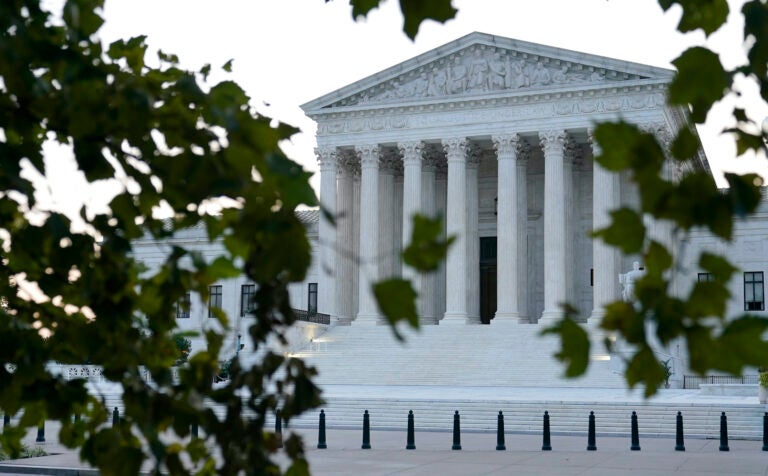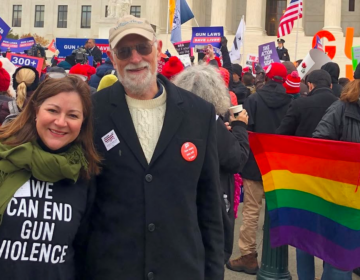Supreme Court hears challenge to Delaware’s partisan court balance requirement
The U.S. Supreme Court heard arguments this week challenging Delaware’s law that requires a balance of Republicans and Democrats on the state’s top three courts.

The sun rises behind the Supreme Court in Washington, Wednesday, Sept. 23, 2020. (AP Photo/Patrick Semansky)
Vacancies on the U.S. Supreme Court have become a major source for partisan battle over the past few decades. And there’s plenty of bickering now over filling the vacancy left by the death of Justice Ruth Bader Ginsburg.
But as that debate rages on in Congress and on the campaign trail, the high court itself is considering a case of partisanship in Delaware courts.
The state’s constitution contains two somewhat unique provisions as part of an effort to keep the state’s courts from becoming a partisan arena. Under those rules, one political party can only have a bare majority in the state’s courts, and all judges on the top three courts must be a member of one of the state’s two major parties. The current Delaware Supreme Court is made up of three Democrats and two Republicans. All were appointed by Democratic governors.
Justices on the U.S. Supreme Court heard a challenge to that requirement from lawyers for James Adams, a private attorney who once worked in the state Department of Justice under then-Attorney General Beau Biden. After changing his party affiliation from Democrat to Independent, Adams sued the state in 2017, claiming his First Amendment rights were being violated because, as a member of the Independent Party of Delaware, he was ineligible to serve as a judge. He claimed that violated his right to “free association.”
In February 2019, a federal appeals court ruled in Adams’ favor, finding Delaware’s requirement to split party affiliation in judge positions is unconstitutional. The state challenged that ruling by the Third Circuit Court of Appeals.
Adams’ lawyer David Finger presented his case to the high court Monday morning. “As long as judicial seats are allocated exclusively to political parties, unaffiliated lawyers are categorically excluded,” he said. “The state’s interest in the stability of its judicial system should not permit it to insulate the judiciary from Independents.”
In making the state’s case, attorney Michael McConnell told the justices the balance rule for Delaware courts has been effective in keeping the state’s courts from partisan fights. “Delaware has used that freedom to create a system unique among the states of constitutionally-mandated political balance for its judiciary, with the result that Delaware’s courts are widely regarded as the least partisan and most professional in the nation.”
McConnell also questioned Adams’ standing in the case, because despite expressing a desire to become a judge, he never applied, not even for Family Court or the Court of Common Plea,s which don’t have the same restrictions on political party makeup. “His big problem is that his actions do not line up with his words,” McConnell said. “It seems evident that he’s really interested here in pursuing a theory that he read about in a law review, not really getting a judgeship.”
Several justices pushed back on that argument, including Justice Elena Kagan. “As long as this constitutional provision is in effect, and he’s an Independent, he’s not going to get a position, so why would we insist that he have to file an application?” she asked.
McConnell said the state’s system has led to a court that’s highly respected. “As to the uniqueness here, this actually, I think, points in Delaware’s favor. It is true that Delaware is the only state that does this. But it is also the only state that has created a judiciary of a particular sort that is fair,” McConnell said. “It’s like the Delaware judiciary is a jewel.”
Finger challenged the state’s position that partisan balance is the reason for Delaware courts’ high regard. “There’s no evidence that political discrimination has had any beneficial effect on the quality of justice in Delaware. Merely repeating that it has doesn’t make it so,” he said.

Get daily updates from WHYY News!
WHYY is your source for fact-based, in-depth journalism and information. As a nonprofit organization, we rely on financial support from readers like you. Please give today.






